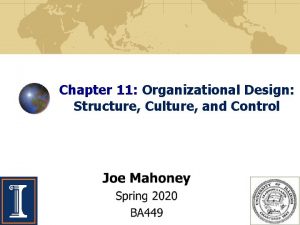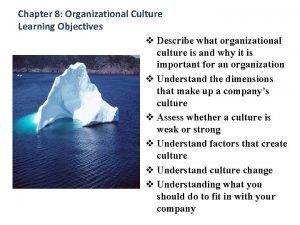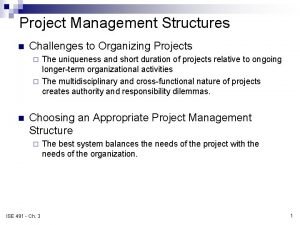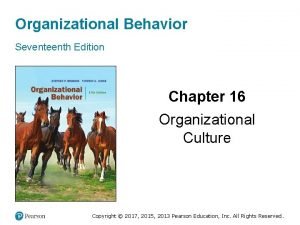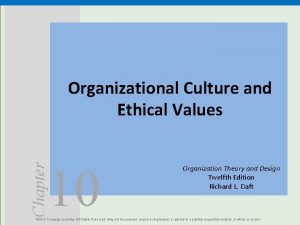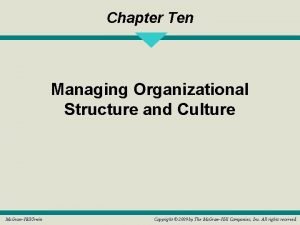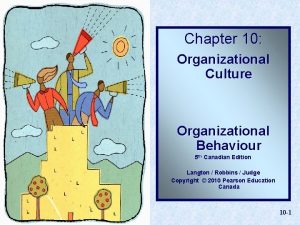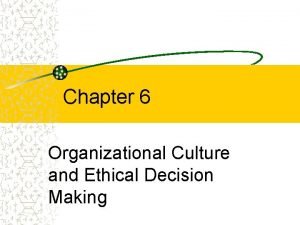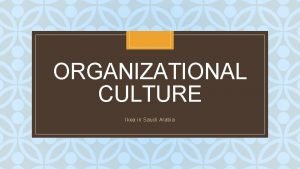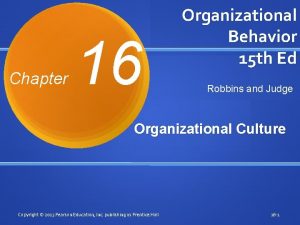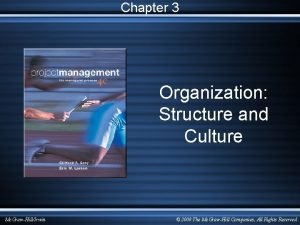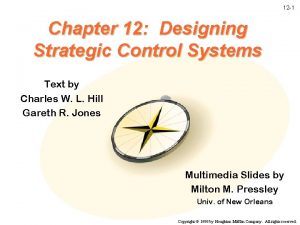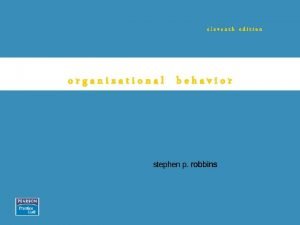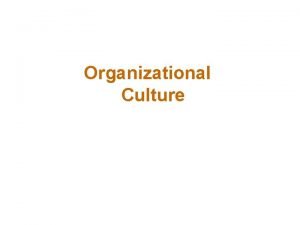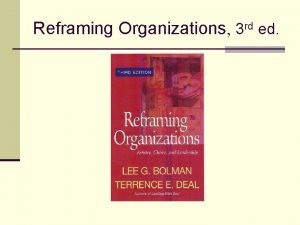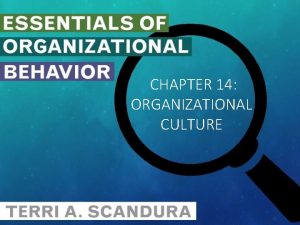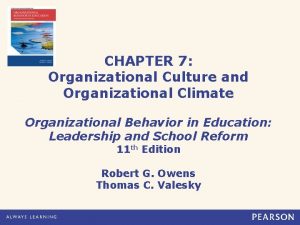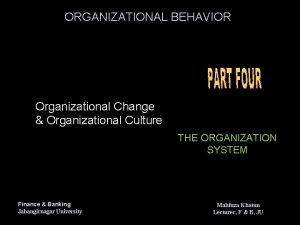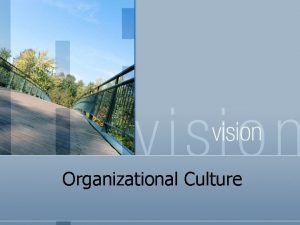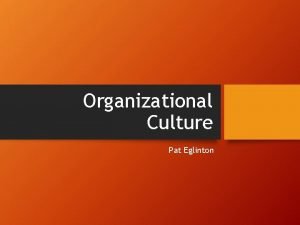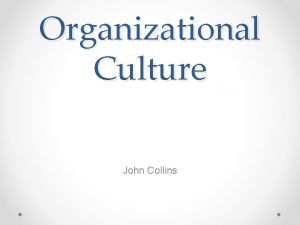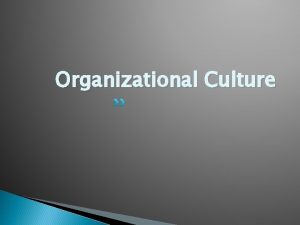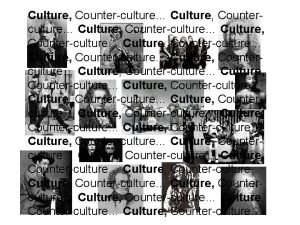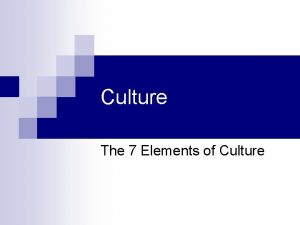Organizational Culture What Is Organizational Culture Organizational Culture















- Slides: 15

Organizational Culture

What Is Organizational Culture? Organizational Culture A common perception held by the organization’s members; a system of shared meaning. Characteristics: 1. Innovation and risk taking 2. Attention to detail 3. Outcome orientation 4. People orientation 5. Team orientation 6. Aggressiveness 7. Stability

Contrasting Organizational Cultures Organization A This organization is a manufacturing firm. Managers are expected to fully document all decisions; and “good managers” are those who can provide detailed data to support their recommendations. Creative decisions that incur significant change or risk are not encouraged. Because managers of failed projects are openly criticized and penalized, managers try not to implement ideas that deviate much from the status quo. One lower-level manager quoted an often used phrase in the company: “If it ain’t broke, don’t fix it. ” There are extensive rules and regulations in this firm that employees are required to follow. Managers supervise employees closely to ensure there are no deviations. Management is concerned with high productivity, regardless of the impact on employee morale or turnover. Work activities are designed around individuals. There are distinct departments and lines of authority, and employees are expected to minimize formal contact with other employees outside their functional area or line of command. Performance evaluations and rewards emphasize individual effort, although seniority tends to be the primary factor in the determination of pay raises and promotions.

Contrasting Organizational Cultures (cont’d) Organization B This organization is also a manufacturing firm. Here, however, management encourages and rewards risk taking and change. Decisions based on intuition are valued as much as those that are well rationalized. Management prides itself on its history of experimenting with new technologies and its success in regularly introducing innovation products. Managers or employees who have a good idea are encouraged to “run with it. ” And failures are treated as “learning experiences. ” The company prides itself on being market-driven and rapidly responsive to the changing needs of its customers. There are few rules and regulations for employees to follow, and supervision is loose because management believes that its employees are hardworking and trustworthy. Management is concerned with high productivity, but believes that this comes through treating its people right. The company is proud of its reputation as being a good place to work. Job activities are designed around work teams, and team members are encouraged to interact with people across functions and authority levels. Employees talk positively about the competition between teams. Individuals and teams have goals, and bonuses are based on achievement of these outcomes. Employees are given considerable autonomy in choosing the means by which the goals are attained.

Do Organizations Have Uniform Cultures? Dominant Culture Expresses the core values that are shared by a majority of the organization’s members. Subcultures Minicultures within an organization, typically defined by department designations and geographical separation.

Do Organizations Have Uniform Cultures? (cont’d) Core Values The primary or dominant values that are accepted throughout the organization. Strong Culture A culture in which the core values are intensely held and widely shared.

What Is Organizational Culture? (cont’d) Ø Culture Versus Formalization – A strong culture increases behavioral consistency and can act as a substitute formalization. Ø Organizational Culture Versus National Culture – National culture has a greater impact on employees than does their organization’s culture. – Nationals selected to work foreign companies may be a typical of the local/native population.

What Do Cultures Do? Culture’s Functions: 1. Defines the boundary between one organization and others. 2. Conveys a sense of identity for its members. 3. Facilitates the generation of commitment to something larger than self-interest. 4. Enhances the stability of the social system. 5. Serves as a sense-making and control mechanism for fitting employees in the organization.

What Do Cultures Do? Culture as a Liability: 1. Barrier to change 2. Barrier to diversity 3. Barrier to acquisitions and mergers

How Culture Begins Ø Founders hire and keep only employees who think and feel the same way they do. Ø Founders indoctrinate and socialize these employees to their way of thinking and feeling. Ø The founders’ own behavior acts as a role model that encourages employees to identify with them and thereby internalize their beliefs, values, and assumptions.

Keeping Culture Alive Ø Selection – Concern with how well the candidates will fit into the organization. – Provides information to candidates about the organization. Ø Top Management – Senior executives help establish behavioral norms that are adopted by the organization. Ø Socialization – The process that helps new employees adapt to the organization’s culture.

How Organization Cultures Form

How Employees Learn Culture • Stories • Rituals • Language

Creating An Ethical Organizational Culture Ø Characteristics of Organizations that Develop High Ethical Standards – High tolerance for risk – Low to moderate in aggressiveness – Focus on means as well as outcomes Ø Managerial Practices Promoting an Ethical Culture – – – Being a visible role model Communicating ethical expectations Providing ethical training Rewarding ethical acts and punishing unethical ones Providing protective mechanisms

How Organizational Cultures Have an Impact on Performance and Satisfaction
 Organizational design: structure, culture, and control
Organizational design: structure, culture, and control Organizational culture is related to the polc function of:
Organizational culture is related to the polc function of: Organizational culture diagnosis worksheet
Organizational culture diagnosis worksheet Organizational cultures often reflect national cultures.
Organizational cultures often reflect national cultures. Organizational culture aspects
Organizational culture aspects Inert organizational culture
Inert organizational culture Characteristics of organizational culture
Characteristics of organizational culture Organizational culture and ethical decision making
Organizational culture and ethical decision making Ikea symbols meaning
Ikea symbols meaning Robbins organizational culture
Robbins organizational culture Organizational culture diagnosis worksheet
Organizational culture diagnosis worksheet Inert organizational culture
Inert organizational culture Denison organizational culture survey
Denison organizational culture survey Do organization have uniform culture
Do organization have uniform culture Institutionalization organizational culture
Institutionalization organizational culture Reframing organizational culture
Reframing organizational culture
